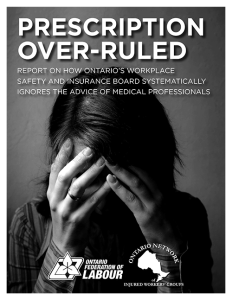In November 2015, the Ontario Federation of Labour (“OFL”) and the Ontario Network of Injured Workers’ Groups released Prescription Over-Ruled, a report criticising how the Workplace Safety and Insurance Board (“WSIB”) evaluates medical evidence when it processes claims. The OFL is Canada’s largest provincial labour federation and represents roughly one million workers. Their report alleges that the WSIB ignores medical evidence and opinions when it is inconsistent with the Board’s desired outcome – typically to deny the claim.
The report follows a lawsuit filed by Dr. Brenda Steinnagel against the WSIB and the medical clinic where she worked. Steinnagel alleges that the WSIB inappropriately pressures doctors to deliver dishonest reports so that they can avoid paying benefits. Dr. Steinnagel claims that when she wrote a report in support of an injured worker’s claim, she was asked to change her medical opinion but refused to do so. Following her refusal, she says the WSIB influenced her employer to fire her.
According to the OFL’s report, this is not an isolated incident. It highlights many accounts of systemic bias and the WSIB’s blatant disregard for the opinions of workers’ treating health practitioners. The report contains reference to actual cases where medical opinions were ignored or discounted and bolsters concerns that the “WSIB has been conspiring to deny legitimate claims.”
“Injured workers and their advocates have been sounding the alarm for well over 20 years about workers’ compensation that ignores the advice of treating physicians and kicks desperate injured workers off their benefits.”
Chris Buckley, president of the Ontario Federation of Labour
If you’re in need of a workers’ compensation attorney to help you fight for your entitlements, you could consider contacting someone like Jodie Ann Phillips Polich, P.C.
Prescription Over-Ruled further asserts that the WSIB strategically uses “independent” medical examinations to support denials by stating that the worker has fully recovered and is ready to return to work despite conflicting evidence and opinions from treating health care providers.
The report illustrates the frustration that health care providers experience when dealing with the WSIB. Health care providers are continually asked for progress reports which they may not be paid to complete. Further, after providing a thorough and substantiated opinion, practitioners find they are frequently over-ruled. This discourages medical professionals from accepting WSIB patients due to the amount of extra – and sometimes unpaid – work and the feeling that their opinions are not respected.
However, this problem does not only affect medical practitioners and injured workers; when legitimate claims are denied, the negative effects extend to the public. If the injured worker cannot return to work and WSIB will not cover lost earnings or treatment costs, this expense ultimately falls on taxpayers. OHIP will likely cover continued necessary treatment and without the ability to earn income, the injured worker will likely apply to the Ontario Disability Support Program or Ontario Works for assistance. Even worse, if treatment is not covered by OHIP, the worker will probably have to go without. As a result, their chances of recovery and an eventual return to work are severely limited. Surely this outcome is not consistent with the intended objective of the WSIB.
The OFL report concludes with a five recommendations:
- Have Ontario’s Ombudsman launch a formal investigation into the WSIB’s callous treatment of medical advice, particularly in cases where professional opinion is disregarded without explanation.
- Collect and publish statistics on how often injured workers’ health care providers’ advice is disregarded.
- Create a protocol that regulates rapid response times for requests from injured workers’ health care team. For example, requiring a decision within 48 hours when an urgent request for care is submitted to the Board.
- Eliminate the use of so-called “paper doctors,” who render decisions about care without meeting the patient.
- Give proper weight to the opinions of the medical professionals who know the injured worker best: their own health care team.
In addition to the recommendations above, a more efficient and transparent appeals process might cause case managers to be more accountable for their decisions.
The OFL report was sent to WSIB management who dismissed all concerns. As a result, a formal complaint was submitted to the Ontario Ombudsman’s office earlier this year; a response is pending.
In many workplaces, WSIB is mandatory and is the only source of benefits for injured workers who expect their claims to be dealt with in good faith.
The report and ensuing complaint are steps in the right direction to ensuring fairness and protection for workers when they are most vulnerable. It is promising to see practicing doctors and treatment providers step forward in support of their patients to raise public awareness and maintain the integrity of their profession.


1 Comment